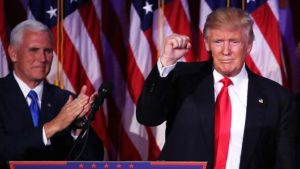by WorldTribune Staff, December 6, 2016
Did Donald Trump beat China to the punch?
The President-elect’s interaction with Taiwan’s president was seen by some observers as a pre-emptive hit on Beijing, which some analysts suggested was intent on delivering a testing Trump early in his administration.

Trump’s 10-minute phone conversation with Taiwan’s president, Tsai Ing-wen, was the first time a senior American leader had conducted a direct conversation with a Taiwanese leader since the United States broke diplomatic ties in shifting recognition to mainland China in 1979.
A statement from the Trump transition team said the two leaders “noted the close economic, political, and security ties between Taiwan and the United States.”
The call prompted an immediate and strong response from pro-Beijing pundits and analysts who said Trump had erred by not first clearing the exchange with Beijing. China’s state media weighed in a day later, denouncing the call.
“Did China ask us if it was OK to devalue their currency (making it hard for our companies to compete), heavily tax our products going into their country (the U.S. doesn’t tax them) or to build a massive military complex in the middle of the South China Sea? I don’t think so!” Trump tweeted on Dec. 4.
The People’s Daily, the official mouthpiece of the ruling Communist Party of China, said the Trump-Tsai conversation “was despicable in nature,” adding “it remains a mystery whether China-U.S. relations will continue smoothly under Trump’s presidency.”
A Trump transition source told the Washington Free Beacon the incoming administration plans to declare China a currency manipulator once in power.
Vice President-elect Mike Pence dismissed criticism of Trump for the call to the Taiwan president as “a little bit of a tempest in a teapot.”
“It’s a little mystifying to me that President Obama can reach out to a murdering dictator in Cuba in the last year and be hailed as a hero for doing it and President-elect Donald Trump takes a courtesy call from a democratically elected leader in Taiwan and it’s become something of a controversy, because I think the American people appreciate the fact that our president-elect is taking calls from and reaching out to the world and preparing on day one to lead America on the world stage,” Pence said.
Under the 1979 Taiwan Relations Act, the United States is obligated to defend Taiwan from a mainland attack. The United States also supplies defensive arms to Taiwan, although the Obama administration has limited arms transfers in recent years.
China analysts said the Trump phone call likely will signal a new direction for U.S. security policy in Asia, despite criticism from some foreign policy experts.
Michael Pillsbury, director of Chinese strategy at the Hudson Institute said he admires Trump’s writing and campaign speeches about how to negotiate with China, including the need to appear “unpredictable” to the Chinese and not revealing one’s strategy in advance.
“Trump is already putting into practice his years of experience and writing about how to negotiate with the Chinese. He does not want them to keep outsmarting us,” Pillsbury said.
John Tkacik, a former State Department China affairs official, said the new Trump initiative on China is a welcome break with previous policies.
“The media figures and academics screaming loudest against the president-elect’s new, and I have to say, refreshing attitude on China are the same ones who have so wisely suggested ‘engagement’ and ‘concessions’ and ‘forthright disagreements’ with China for 25 years but have cautioned against any retaliation,” said Tkacik.
